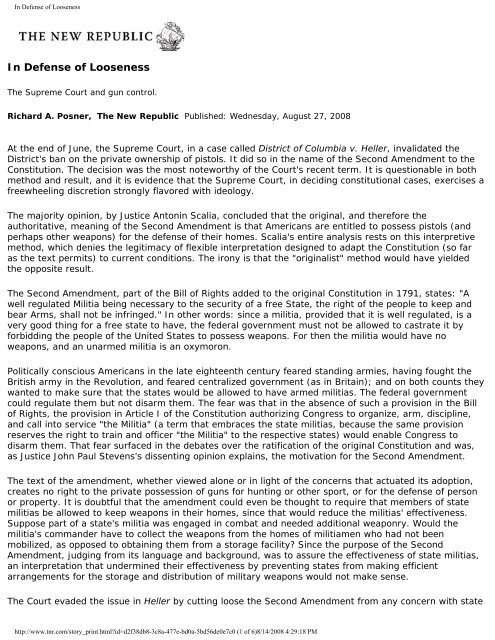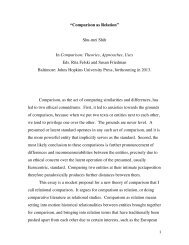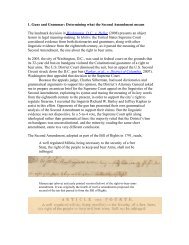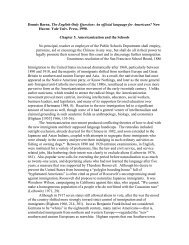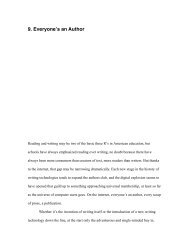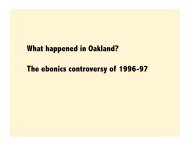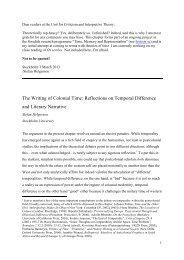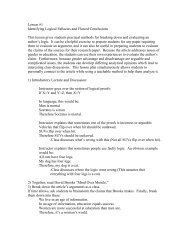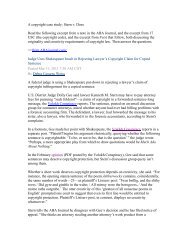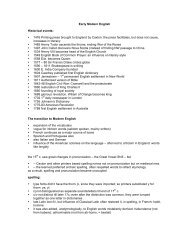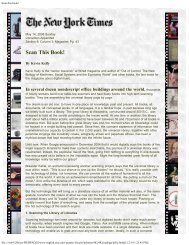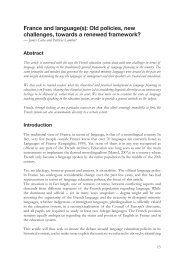Richard Posner: In Defense of Looseness - English
Richard Posner: In Defense of Looseness - English
Richard Posner: In Defense of Looseness - English
You also want an ePaper? Increase the reach of your titles
YUMPU automatically turns print PDFs into web optimized ePapers that Google loves.
<strong>In</strong> <strong>Defense</strong> <strong>of</strong> <strong>Looseness</strong><strong>In</strong> <strong>Defense</strong> <strong>of</strong> <strong>Looseness</strong>The Supreme Court and gun control.<strong>Richard</strong> A. <strong>Posner</strong>, The New Republic Published: Wednesday, August 27, 2008At the end <strong>of</strong> June, the Supreme Court, in a case called District <strong>of</strong> Columbia v. Heller, invalidated theDistrict's ban on the private ownership <strong>of</strong> pistols. It did so in the name <strong>of</strong> the Second Amendment to theConstitution. The decision was the most noteworthy <strong>of</strong> the Court's recent term. It is questionable in bothmethod and result, and it is evidence that the Supreme Court, in deciding constitutional cases, exercises afreewheeling discretion strongly flavored with ideology.The majority opinion, by Justice Antonin Scalia, concluded that the original, and therefore theauthoritative, meaning <strong>of</strong> the Second Amendment is that Americans are entitled to possess pistols (andperhaps other weapons) for the defense <strong>of</strong> their homes. Scalia's entire analysis rests on this interpretivemethod, which denies the legitimacy <strong>of</strong> flexible interpretation designed to adapt the Constitution (so faras the text permits) to current conditions. The irony is that the "originalist" method would have yieldedthe opposite result.The Second Amendment, part <strong>of</strong> the Bill <strong>of</strong> Rights added to the original Constitution in 1791, states: "Awell regulated Militia being necessary to the security <strong>of</strong> a free State, the right <strong>of</strong> the people to keep andbear Arms, shall not be infringed." <strong>In</strong> other words: since a militia, provided that it is well regulated, is avery good thing for a free state to have, the federal government must not be allowed to castrate it byforbidding the people <strong>of</strong> the United States to possess weapons. For then the militia would have noweapons, and an unarmed militia is an oxymoron.Politically conscious Americans in the late eighteenth century feared standing armies, having fought theBritish army in the Revolution, and feared centralized government (as in Britain); and on both counts theywanted to make sure that the states would be allowed to have armed militias. The federal governmentcould regulate them but not disarm them. The fear was that in the absence <strong>of</strong> such a provision in the Bill<strong>of</strong> Rights, the provision in Article I <strong>of</strong> the Constitution authorizing Congress to organize, arm, discipline,and call into service "the Militia" (a term that embraces the state militias, because the same provisionreserves the right to train and <strong>of</strong>ficer "the Militia" to the respective states) would enable Congress todisarm them. That fear surfaced in the debates over the ratification <strong>of</strong> the original Constitution and was,as Justice John Paul Stevens's dissenting opinion explains, the motivation for the Second Amendment.The text <strong>of</strong> the amendment, whether viewed alone or in light <strong>of</strong> the concerns that actuated its adoption,creates no right to the private possession <strong>of</strong> guns for hunting or other sport, or for the defense <strong>of</strong> personor property. It is doubtful that the amendment could even be thought to require that members <strong>of</strong> statemilitias be allowed to keep weapons in their homes, since that would reduce the militias' effectiveness.Suppose part <strong>of</strong> a state's militia was engaged in combat and needed additional weaponry. Would themilitia's commander have to collect the weapons from the homes <strong>of</strong> militiamen who had not beenmobilized, as opposed to obtaining them from a storage facility? Since the purpose <strong>of</strong> the SecondAmendment, judging from its language and background, was to assure the effectiveness <strong>of</strong> state militias,an interpretation that undermined their effectiveness by preventing states from making efficientarrangements for the storage and distribution <strong>of</strong> military weapons would not make sense.The Court evaded the issue in Heller by cutting loose the Second Amendment from any concern with statehttp://www.tnr.com/story_print.html?id=d2f38db8-3c8a-477e-bd0a-5bd56de0e7c0 (1 <strong>of</strong> 6)8/14/2008 4:29:18 PM
<strong>In</strong> <strong>Defense</strong> <strong>of</strong> <strong>Looseness</strong>militias (the "National Guard," as they are now called). The majority opinion acknowledges that allowingpeople to keep guns in their homes cannot help the militias, because modern military weapons are notappropriate for home defense (most <strong>of</strong> them are too dangerous), and anyway the opinion says that theonly weapons the Second Amendment entitles people to possess are ones that are not "highly unusual insociety at large." Modern military weapons are highly unusual in society at large. By creating a privilegeto own guns <strong>of</strong> no interest to a militia, the Court decoupled the amendment's two clauses.It justified this decoupling by arguing that the word "people" in the expression "the right <strong>of</strong> the people tokeep and bear Arms" (the amendment's second clause) must encompass more than just militiamen,because eighteenth-century militias enrolled only able-bodied free men--a mere subset <strong>of</strong> the people <strong>of</strong>the United States. But obviously the Framers did not mean to confer even a prima facie constitutionalright to possess guns on slaves, criminals, lunatics, and children. The purpose <strong>of</strong> the first clause <strong>of</strong> theamendment, the militia clause, is to narrow the right that the second clause confers on the "people."My analysis to this point has been "originalist"--and it has led to the opposite conclusion from that <strong>of</strong> themajority <strong>of</strong> the Supreme Court. It has been a narrow originalism, like that <strong>of</strong> Scalia's majority opinion,because it has ignored the interpretive conventions <strong>of</strong> the legal culture in which the Second Amendmentwas drafted and ratified. The reigning theory <strong>of</strong> legislative interpretation in the eighteenth century wasloose (or flexible, or nonliteral) construction. This is explicit in William Blackstone's Commentaries on theLaws <strong>of</strong> England, on which the majority opinion in Heller ironically relies. <strong>In</strong> the Commentaries we readthat a medieval law <strong>of</strong> Bologna stating that "whoever drew blood in the streets should be punished withthe utmost severity" should not be interpreted to make punishable a surgeon "who opened the vein <strong>of</strong> aperson that fell down in the street with a fit." Blackstone explained that "the fairest and most rationalmethod to interpret the will <strong>of</strong> the legislator, is by exploring his intentions at the time when the law wasmade, by signs the most natural and probable. And these signs are either the words, the context, thesubject matter, the effects and consequence, or the spirit and reason <strong>of</strong> the law.... As to the effects andconsequence, the rule is, where words bear either none, or a very absurd signification, if literallyunderstood, we must a little deviate from the received sense <strong>of</strong> them" (emphasis added). John Marshall,the greatest Supreme Court justice <strong>of</strong> the generation that wrote the Constitution and the Bill <strong>of</strong> Rights,was also a loose constructionist.Originalism without the interpretive theory that the Framers and the ratifiers <strong>of</strong> the Constitution expectedthe courts to use in construing constitutional provisions is faux originalism. True originalism licenses looseconstruction. And loose construction is especially appropriate for interpreting a constitutional provisionratified more than two centuries ago, dealing with a subject that has been transformed in the interveningperiod by social and technological change, including urbanization and a revolution in warfare andweaponry.The Framers <strong>of</strong> the Bill <strong>of</strong> Rights could not have been thinking <strong>of</strong> the crime problem in the large crimeriddenmetropolises <strong>of</strong> twenty-first-century America, and it is unlikely that they intended to freezeAmerican government two centuries hence at their eighteenth-century level <strong>of</strong> understanding. Because <strong>of</strong>the difficulty <strong>of</strong> amending the Constitution, it has from the beginning been loosely construed so as not tobecome a straitjacket or a suicide pact. The older the constitutional provision and the more theenvironment has changed since enactment, the more appropriate is the method <strong>of</strong> loose construction.There are few more antiquated constitutional provisions than the Second Amendment. For example, theFramers and the ratifiers <strong>of</strong> the amendment probably did think that the right <strong>of</strong> militiamen to keep andbear arms entitled them to keep their weapons in their homes. They were expected to provide themilitia's muskets rather than receive them from a weapons depot. Back then, moreover, guns required alot <strong>of</strong> upkeep. Without constant care, they would rust and the powder would become moist. Storing theguns at a warehouse would have left many <strong>of</strong> them inoperable. To use this "original" understanding toallow members <strong>of</strong> the National Guard to store military weapons (machine guns, grenades, Hummers, andso on) would be preposterous, and it is disclaimed in the majority opinion.http://www.tnr.com/story_print.html?id=d2f38db8-3c8a-477e-bd0a-5bd56de0e7c0 (2 <strong>of</strong> 6)8/14/2008 4:29:18 PM
<strong>In</strong> <strong>Defense</strong> <strong>of</strong> <strong>Looseness</strong><strong>In</strong> these and other ways, the Heller decision is exposed as an example <strong>of</strong> loose construction--despite theCourt's pretense <strong>of</strong> engaging in originalist interpretation (but again, an originalism stripped <strong>of</strong> the originalunderstanding <strong>of</strong> how a constitutional provision should be interpreted). Just as when the Supreme Court,in 1947 in Adamson v. California, decided in the teeth <strong>of</strong> the language <strong>of</strong> the Fourteenth Amendment thatthe amendment "incorporates" the Bill <strong>of</strong> Rights, an exercise <strong>of</strong> judicial discretion is presented in Heller ashistorically determined. The Bill <strong>of</strong> Rights was added to the original Constitution to limit federal power.One provision <strong>of</strong> the Bill <strong>of</strong> Rights forbids government to deprive persons <strong>of</strong> life, liberty, or propertywithout due process <strong>of</strong> law. The Fourteenth Amendment contains an identical due process clause, butdirected against state action. The Court in Adamson turned historical handsprings to interpret theFourteenth Amendment's due process clause as incorporating--that is, making applicable to state action--most <strong>of</strong> the other provisions <strong>of</strong> the Bill <strong>of</strong> Rights. If Heller is applied to the states, it will be on theauthority <strong>of</strong> Adamson.The true springs <strong>of</strong> the Heller decision must be sought elsewhere than in the majority's declaredcommitment to originalism. The idea behind the decision--it is not articulated, <strong>of</strong> course, and perhaps noteven consciously held--may simply be that turnabout is fair play. Liberal judges have used looseconstruction to expand constitutional prohibitions beyond any reasonable construal <strong>of</strong> original meaning;and now it is the conservatives' turn. Another plausible example <strong>of</strong> payback is the conservative justices'expansive interpretation <strong>of</strong> the free-speech clause <strong>of</strong> the First Amendment to limit regulation <strong>of</strong> campaignfinancing.It is possible that in both the gun-control case and the campaign-finance cases the justices in themajority, rather than playing tit for tat, thought the laws they were invalidating very dumb, and in thecase <strong>of</strong> the District <strong>of</strong> Columbia's ban on possession <strong>of</strong> pistols thought the law wimpish and paternalistic,like requiring bikers to wear helmets. A law that bans possession <strong>of</strong> pistols outright may even be inferior,at least as a method <strong>of</strong> controlling crime, to a law that combines strict permit requirements with heavypenalties for violating them, or even to one that simply imposes draconian penalties on crimes committedwith guns. But judges are not supposed to invalidate laws merely because, as legislators, they would havevoted against them.There is an important difference, obvious but <strong>of</strong>ten overlooked, between using loose construction toprevent making the Constitution a straitjacket and using it to make the Constitution a straitjacket. <strong>In</strong>Kennedy v. Louisiana, a decision handed down shortly before Heller, the Supreme Court held that toexecute a person who rapes a child but does not kill her violates the cruel and unusual punishmentsclause <strong>of</strong> the Eighth Amendment. That was a loose construction that tied the hands <strong>of</strong> the states and thefederal government, and Scalia and the other conservative justices dissented. But in Heller it was theliberal justices who were dissenting from a decision that ties the hands <strong>of</strong> the federal government, and <strong>of</strong>the states, too, if the Supreme Court decides that the Second Amendment constrains state as well asfederal government action. Compare these two cases to the Zelman case, decided several years ago.There the Court upheld, against a challenge based on the clause <strong>of</strong> the First Amendment that forbidsgovernmental establishments <strong>of</strong> religion, the funneling <strong>of</strong> public monies to private schools by means <strong>of</strong>vouchers that parents can use to pay for their kids' tuition. Most private schools are Catholic parochialschools. The interpretation <strong>of</strong> the establishment clause that permitted the use <strong>of</strong> public moneys to financeparochial schools rejected the imposition on government <strong>of</strong> a constitutional restraint that the liberaljustices wanted to impose.Another illuminating contrast to Heller is the recent Kelo decision. The Supreme Court held that the justcompensation clause <strong>of</strong> the Fifth Amendment does not forbid a state to condemn private property and,having thus seized it, to turn it over to a private developer. The decision provoked outrage byconservatives, who oppose condemnation because it infringes rights <strong>of</strong> private property. They should nothave been outraged. All the Court did was unshackle government from a potential constitutionalconstraint, and by doing so toss the issue into the political arena. And sure enough, in the wake <strong>of</strong> thedecision a number <strong>of</strong> states, under pressure from property interests, curtailed their eminent domainpowers.http://www.tnr.com/story_print.html?id=d2f38db8-3c8a-477e-bd0a-5bd56de0e7c0 (3 <strong>of</strong> 6)8/14/2008 4:29:18 PM
<strong>In</strong> <strong>Defense</strong> <strong>of</strong> <strong>Looseness</strong>Similarly, had the Supreme Court upheld the District <strong>of</strong> Columbia gun ordinance, it would not have beenoutlawing the private possession <strong>of</strong> guns. It would merely have been leaving the issue <strong>of</strong> gun control tothe political process. The popularity <strong>of</strong> the decision and its prompt endorsement by both presidentialcandidates attests to the political power <strong>of</strong> the "gun lobby"; and an unpopular decision in favor <strong>of</strong> thegovernment would actually have strengthened the lobby, just as Roe v. Wade strengthened the antiabortionmovement. The proper time for using loose construction to enlarge constitutional restrictions ongovernment action is when the group seeking the enlargement does not have good access to the politicalprocess to protect its interests, as abortion advocates, like gun advocates, did and do.Constitutional interpretations that relax rather than tighten the Constitution's grip on the legislativeand executive branches <strong>of</strong> government are especially welcome when there are regional or localdifferences in relevant conditions or in public opinion. The failure to recognize this point (or perhapsindifference to it) was the mistake that the Supreme Court made when it nationalized abortion rights inRoe v. Wade. It would be the mistake the Court would be making in the unlikely event that it created afederal constitutional right <strong>of</strong> homosexual marriage. It is the mistake the Court has made in Heller. Thedifferences in attitudes toward private ownership <strong>of</strong> pistols across regions <strong>of</strong> the country and, outside theSouth, between urban and rural areas, are pr<strong>of</strong>ound (mirroring the national diversity <strong>of</strong> views about gaymarriage, and gay rights in general, as well as about abortion rights). A uniform rule is neither necessarynor appropriate. Yet that is what the Heller decision will produce if its rule is held applicable to the statesas well as to the District <strong>of</strong> Columbia and other federal enclaves.Heller gives short shrift to the values <strong>of</strong> federalism, and to the related values <strong>of</strong> cultural diversity, localpreference, and social experimentation. A majority <strong>of</strong> Americans support gun rights. But if the District <strong>of</strong>Columbia (or Chicago or New York) wants to ban guns, why should the views <strong>of</strong> a national majoritycontrol? Is that democracy, or is it Rousseau's forced conformity to the "general will"? True, a member <strong>of</strong>a national majority can be a member <strong>of</strong> a minority within a local area: gun buffs in Washington, D.C., forexample. But a person who is a member <strong>of</strong> a local minority but a national majority can relocate to a part<strong>of</strong> the country in which the national majority rules. A resident <strong>of</strong> Washington can move to northernVirginia. This is not to say that there should be no national rights--that Mississippi should be permitted tostone adulterers, or Rhode Island to ban The Da Vinci Code. But the question <strong>of</strong> whether to nationalize anissue in the name <strong>of</strong> the Constitution calls for an exercise <strong>of</strong> judgment; and when the nation is deeplydivided over an issue to which the Constitution does not speak with any clarity, and a uniform nationalpolicy would override differences in local conditions, nationalization may be premature.There is a further difference between constitutional interpretations that permit government action andones that forbid it: only the latter create new business for the federal courts. Conservatives rightly decrythe enormous expansion in the federal caseload caused by the aggressive constitutional rulings <strong>of</strong> liberaljustices in the 1960s. But if the new rule declared in Heller is applied to the states, we may see a similarresult, this time engineered by conservatives; and we will have further confirmation that the WarrenCourt liberated conservative as well as liberal judges from the constraint <strong>of</strong> judicial modesty. Every time agun permit is denied, the disappointed applicant will have a potential constitutional claim litigable in thefederal courts.Justice Scalia was emphatic that the right to possess a gun is not absolute. He sparred with JusticeStephen Breyer (who wrote a separate dissenting opinion) over the standard to be applied to restrictionson gun ownership. All that is clear is that an absolute ban on possessing a pistol is unconstitutional. Theother restrictions that a government might want to impose are up for grabs. It may take many years forthe dust to settle--many years <strong>of</strong> lawsuits that our litigious society does not need.Conservatives rightly believe, moreover, that the efficacy <strong>of</strong> legally enforceable rights as an engine forsocial reform is overrated. The effects even <strong>of</strong> such well known and generally applauded decisions asthose invalidating racial segregation <strong>of</strong> public schools and the malapportionment <strong>of</strong> state legislatures areuncertain, and may not have been, on balance, beneficial. The only certain effect <strong>of</strong> the Heller decision--http://www.tnr.com/story_print.html?id=d2f38db8-3c8a-477e-bd0a-5bd56de0e7c0 (4 <strong>of</strong> 6)8/14/2008 4:29:18 PM
<strong>In</strong> <strong>Defense</strong> <strong>of</strong> <strong>Looseness</strong>for the scholarly literature has yet to reach consensus on the effects <strong>of</strong> gun-control laws--will be toincrease litigation over gun ownership.I cannot discern any principles in the pattern <strong>of</strong> the Supreme Court's constitutional interpretations. Theabsence <strong>of</strong> principles supports the hypothesis that ideology drives decision in cases in which liberal andconservative values collide. If loose construction produces a conservative limitation on government, mostconservatives will support it and most liberals will oppose it; and if it produces a liberal limitation ongovernment, most liberals and conservatives will switch sides. The qualification in "most" is important,though. Scalia has voted to invalidate, on free-speech grounds, laws forbidding the burning <strong>of</strong> theAmerican flag. That is loose construction--decidedly non-originalist in the narrow sense <strong>of</strong> his opinion inHeller--because burning is not speech; and it is a loose construction that produces a liberal outcome.Breyer concurred in a decision that allowed the Ten Commandments to be exhibited on the grounds <strong>of</strong> theTexas Capitol; and that was a conservative vote (and the swing vote in the case) by a liberal justice.Whatever generated these justices' uncharacteristic votes in those two cases, it was not a decisionmakingmethod that prevents the exercise <strong>of</strong> discretion. Both justices employ judicial methodologies thatleave them with plenty <strong>of</strong> running room. <strong>In</strong> his dissent in the Zelman case, Breyer argued that the schoolvoucher system was unconstitutional because there was a "risk" that it could create "a form <strong>of</strong> religiouslybased conflict potentially harmful to the Nation's social fabric." <strong>In</strong> his dissent in Heller he reversed theburden, arguing that the risk that allowing limited gun ownership in the District <strong>of</strong> Columbia would lead tomore death and injury from guns was enough to uphold the District's gun law against constitutionalchallenge.Since Stevens devoted most <strong>of</strong> his dissenting opinion in Heller to his own interpretation <strong>of</strong> the originalmeaning <strong>of</strong> the Second Amendment, observers may conclude that the entire Court has now embracedoriginalism as the canonical method <strong>of</strong> interpreting the Constitution. But this is not a plausible inference inlight <strong>of</strong> the child-rapist case <strong>of</strong> just a few weeks earlier (non-murdering rapists <strong>of</strong> adult women were beingexecuted in the United States as recently as the 1960s), from which Scalia dissented. One supposes thatStevens could not resist meeting the majority on its own ground, since the text and the history (both preandpost-enactment) <strong>of</strong> the Second Amendment favor the dissent. Among other things, pr<strong>of</strong>essionalhistorians were on Stevens's side.Still, his opinion seems to me too dogmatic (the historical evidence is not as one-sided as his opinionsuggests); and it leaves the impression that all that divided the two wings <strong>of</strong> the Court was adisagreement over the historical record. That was playing into Scalia's hands. The majority (and thedissent as well) was engaged in what is derisively referred to--the derision is richly deserved--as "law<strong>of</strong>fice history." Lawyers are advocates for their clients, and judges are advocates for whichever side <strong>of</strong> thecase they have decided to vote for. The judge sends his law clerks scurrying to the library and to the Webfor bits and pieces <strong>of</strong> historical documentation. When the clerks are the numerous and able clerks <strong>of</strong>Supreme Court justices, enjoying the assistance <strong>of</strong> the capable staffs <strong>of</strong> the Supreme Court library andthe Library <strong>of</strong> Congress, and when dozens and sometimes hundreds <strong>of</strong> amicus curiae briefs have beenfiled, many bulked out with the fruits <strong>of</strong> their authors' own law-<strong>of</strong>fice historiography, it is a simple matter,especially for a skillful rhetorician such as Scalia, to write a plausible historical defense <strong>of</strong> his position.But it was not so simple in Heller, and Scalia and his staff labored mightily to produce a long opinion (themajority opinion is almost 25,000 words long) that would convince, or perhaps just overwhelm, thedoubters. The range <strong>of</strong> historical references in the majority opinion is breathtaking, but it is not evidence<strong>of</strong> disinterested historical inquiry. It is evidence <strong>of</strong> the ability <strong>of</strong> well-staffed courts to produce snow jobs.This is strikingly shown by the lengthy discussion <strong>of</strong> the history <strong>of</strong> interpretation <strong>of</strong> the SecondAmendment. Scalia quotes a number <strong>of</strong> statements to the effect that the amendment guarantees apersonal right to possess guns--but they are statements by lawyers or other advocates, includinglegislators and judges and law pr<strong>of</strong>essors all tendentiously dabbling in history, rather than byhttp://www.tnr.com/story_print.html?id=d2f38db8-3c8a-477e-bd0a-5bd56de0e7c0 (5 <strong>of</strong> 6)8/14/2008 4:29:18 PM
<strong>In</strong> <strong>Defense</strong> <strong>of</strong> <strong>Looseness</strong>disinterested historians: more law-<strong>of</strong>fice history, in other words. Sanford Levinson, a distinguishedconstitutional law pr<strong>of</strong>essor, has candidly acknowledged that the most important reason for his support <strong>of</strong>a constitutional right <strong>of</strong> private possession <strong>of</strong> guns is that opposition to this right is harmful to theelectoral prospects <strong>of</strong> the Democratic Party.The statements that the majority opinion cited had little traction before Heller. For more than twocenturies, the "right" to private possession <strong>of</strong> guns, supposedly created by the Second Amendment, hadlain dormant. Constitutional rights <strong>of</strong>ten lie dormant, spectral subjects <strong>of</strong> theoretical speculation, untilsome change in the social environment creates a demand for their vivification and enforcement. Butnothing has changed in the social environment to justify giving the Second Amendment a new lifediscontinuous with its old one: a new wine in a decidedly old wineskin. There is no greater urgency aboutallowing people to possess guns for self-defense or defense <strong>of</strong> property today than there was thirty yearsago, when the prevalence <strong>of</strong> violent crime was greater, or for that matter one hundred years ago. Onlythe membership <strong>of</strong> the Supreme Court has changed.If constitutional decisions are to be determined by the balance between liberals and conservatives on theSupreme Court, the fig-leafing that we find in Heller--the historicizing glaze on personal values and policypreferences--will continue to be irresistibly tempting to the justices, with their large and tireless staffs andtheir commitment to a mystique <strong>of</strong> "objective" interpretation. There is no way to purge political principlesfrom constitutional decision-making, but they do not have to be liberal or conservative principles. Apreference for judicial modesty--for less interference by the Supreme Court with the other branches <strong>of</strong>government--cannot be derived by some logical process from constitutional text or history. It would haveto be imposed. It would be a discretionary choice by the justices. But judging from Heller, it would be awise choice. It would go some distance toward de-politicizing the Supreme Court. It would lower thetemperature <strong>of</strong> judicial confirmation hearings, widen the field <strong>of</strong> selection <strong>of</strong> justices, and enable theSupreme Court to attend to the many important non-constitutional issues that it is inclined to neglect.<strong>Richard</strong> A. <strong>Posner</strong> is a judge for the Seventh Circuit <strong>of</strong> the U.S. Court <strong>of</strong> Appeals and a senior lecturer atthe University <strong>of</strong> Chicago.Subscribe to The New Republic for only $29.97 a year--75% <strong>of</strong>f cover price!Copyright © 2007 The New Republic. All rights reserved.http://www.tnr.com/story_print.html?id=d2f38db8-3c8a-477e-bd0a-5bd56de0e7c0 (6 <strong>of</strong> 6)8/14/2008 4:29:18 PM


